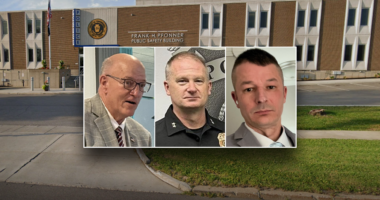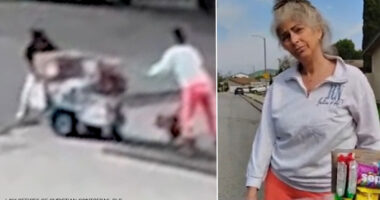Prosecutors will not have access to Karen Read’s parents’ phone records, which they argue could prove she did something wrong on the night her boyfriend died.
Norfolk Superior Court Judge Beverly Cannone denied special prosecutor Hank Brennan’s request to compel Verizon to hand over the records.
A petition was filed requesting access to the calls between Read and her parents after she allegedly hit Boston police officer John O’Keefe with her SUV on January 29, 2022.
Read was accused of murdering O’Keefe after a night out, but she claims that he was actually attacked by individuals inside the house where his body was discovered on the front lawn.
Her first murder trial ended with a hung jury on July 1 and a retrial is scheduled for January, which will likely again be picketed by her army of supporters.
Both prosecutors and her defense requested to have the trial pushed back to April.
Judge Cannone ruled Brennan’s petition did not meet the legal requirements for a pretrial motion seeking third-party records.
‘Despite the detailed arguments articulated in the supporting memorandum and at oral argument, the affidavit in support of the motion is insufficient on it’s face,’ she wrote.

Karen Read prosecutors will not be allowed to access her parents’ phone records they claim prove she ‘had done something terrible’ on he night her boyfriend died

John O’Keefe, a 16-year Boston cop, was found dead around 6am on January 29, 2022, outside a house where Read dropped him off for a party around 12.45am. Prosecutors alleged Read hit him with her SUV, and she claimed she was framed
Read claimed she dropped O’Keefe off at the afterparty and went home, then searched for him in the morning when he didn’t come home – eventually finding him dead in the snow.
Brennan in his request said she called her parents Janet and William Read several times in the early hours of the morning, around the time she claimed she left O’Keefe..
‘The inference that a 40-something-year-old woman is calling her parents at 1.30 in the morning after this tumultuous event, the inference is strong evidence that Ms. Read knew she had done something terrible,’ he alleged on November 29.
‘She knew she had struck John O’Keefe, and she knew she had left him behind.’
Prosecutors with the Norfolk District Attorney’s Office claimed the phone records would show she called her mother three times, at 1:14am, 4:38am, and 4:42am, and her father at 6:32am – none of which were answered.
Brennan’s request covered a 30-day window between December 30, 2021, to January 30, 2022, which he said was merely to establish whether Read often called her parents so late at night.
‘If there were phone calls at 1.30 in the morning I would not argue the inference that it was remarkable. That would be an unfair inference,’ he said.
‘But in the absence of any other calls, it is terribly remarkable that she’s panic-calling her parents at 1.30 in the morning.’

Prosecutor Hank Brennan, who oversaw Read’s first trial, argued that Read’s phone calls to her parents will provide ‘strong evidence that Ms Read knew she had done something terrible’

Read allegedly called her mother Janet three times, at 1:14am, 4:38am, and 4:42am, and her father William at 6:32am, on the night O’Keefe died
Brennan argued the request was important because O’Keefe’s life could have been saved if he got timely medical attention, instead of slowing dying in the snowstorm.
Defense attorney Elizabeth Little called the request a ‘fishing expedition’ and a ‘gross invasion’ of privacy.
‘The Commonwealth is asking this court to sanction this gross invasion of her father’s privacy so the Commonwealth can sift through Mr. Read’s electronic data for information that is already in the possession of the Commonwealth,’ she said.
Read argued at her first trial that she was the victim of a wide-ranging conspiracy including the Boston Police Department to frame her.
Brennan also requested the release of journalists’ notes and recordings of interviews Read gave to a Boston Magazine reporter last year for a story.
Prosecutors said they were in possession of two recordings of the interview, but there were about 150 redactions, and they wanted unredacted versions.
They claimed these redactions included comments from Read that contradicted statements she made to other outlets, and there were other moments where Read made a statement before a redaction then resumed with a different story.
In one example reported by the Globe, Read allegedly made an ‘admission of drinking a vodka tonic every 40 minutes’ at a bar with O’Keefe on the night of his death.

Read and O’Keefe had been dating for two years at the time of his death. He had been serving on the Boston Police Department for 16 years

Read’s first trial in July ended in a mistrial as the jury was deadlocked, and she faces a second murder trial in January 2025
When the audio resumed, court records claimed she offered a ‘non-sequitur claiming to consume sips of water’ at a second bar, while she previously told 20/20: ‘I had had probably about four [drinks], and not four that I completed either. I didn’t drink maybe more than a few sips at’ the second bar.
‘Clearly something happened during that redaction that changed the admission to drinking alcohol, which is part of this case, to something of water,’ Brennan said at the November 29 hearing.
Judge Cannone is yet to rule on these requests, and other made by the prosecution as it cats a wider net than before the first trial.
The case will next got to court on December 12.
Read has maintained her innocence in the case and says she intends to fight to clear her name when she faces a second murder trial in January.
Although her jury was deadlocked, O’Keefe’s family launched a wrongful death lawsuit against her.
Prosecutors alleged Read hit O’Keefe with her car following a drunken argument as she dropped him off at the home for an after party, and claimed to have found pieces of her car’s tail light around his body.
She spent the evening drinking with O’Keefe and friends at the Waterfall Bar and Grill in Canton, about 14 miles south of Boston, and the group were invited to the home of his friend Brian Albert, a retired Boston police officer.

Chilling footage showing Read in a Boston bar on the night she allegedly killed her cop boyfriend was played in court


Read came under scrutiny for a perceived flippant attitude in court, including winking at cameras and snacking during proceedings
Read, whom prosecutors alleged drank several alcoholic drinks beforehand, decided to drop O’Keefe at the afterparty before she went to his home – that he shared with his orphaned niece and nephew – to sleep at around 1am.
Court documents revealed that the couple had been bitterly arguing for weeks beforehand, and on the night O’Keefe died, Read left him a voicemail calling him a ‘f**king loser’, and ‘John, I f**king hate you.’
The couple had been dating for two years at the time of O’Keefe’s death. He served with the Boston Police Department for 16 years.
As the party went on inside Albert’s home, Read said she woke up around 4am to find that he was not at home, and told O’Keefe’s niece that she was ‘distraught.’
Attendees at the party, including some law enforcement, claimed O’Keefe never arrived at the party or entered the home.
Read then searched for O’Keefe with a friend, and prosecutors allege that during the search she told her: ‘What if he’s dead? What if a plow hit him?… I don’t remember anything from last night, we drank so much I don’t remember anything.’
At 6am, Read found O’Keefe laying in the snow outside Albert’s home, and a first responder on the scene reportedly claimed Read repeatedly cried out, ‘I hit him, I hit him’, reports CBS News.

When her trial began, Read received a slew of support from true crime fans and locals who camped outside the courthouse with signs reading ‘Free Karen Read’
O’Keefe was rushed to hospital, where he was pronounced dead. An autopsy found that the cause of death was blunt impact injuries and hypothermia.
Read’s defense countered that she is the victim of an extensive conspiracy to frame her, and claimed the police officer may have actually been attacked by other officers and attendees at the party where he was found dead.
Throughout her trial, Read’s claims that she was framed also drew a legion of fans, who wore pink to show their support and were often staked out outside the courthouse.
The judge in her case even filed a ruling at the start of the trial banning supporters from coming within 200 feet of the courthouse.
Read’s courthouse behavior also sparked backlash as she was branded ‘America’s happiest murder defendant’, as she appeared to soak up the attention while winking at the cameras and snacking in court.

















